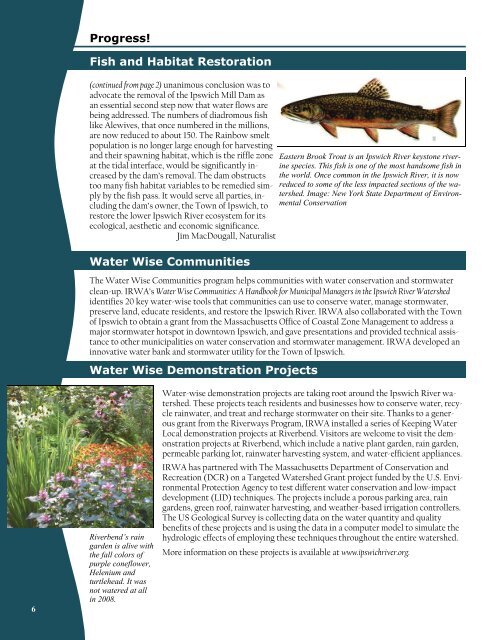2008 Annual Report (PDF) - Ipswich River Watershed Association
2008 Annual Report (PDF) - Ipswich River Watershed Association
2008 Annual Report (PDF) - Ipswich River Watershed Association
Create successful ePaper yourself
Turn your PDF publications into a flip-book with our unique Google optimized e-Paper software.
6<br />
Progress!<br />
Fish and Habitat Restoration<br />
(continued from page 2) unanimous conclusion was to<br />
advocate the removal of the <strong>Ipswich</strong> Mill Dam as<br />
an essential second step now that water flows are<br />
being addressed. The numbers of diadromous fish<br />
like Alewives, that once numbered in the millions,<br />
are now reduced to about 150. The Rainbow smelt<br />
population is no longer large enough for harvesting<br />
and their spawning habitat, which is the riffle zone Eastern Brook Trout is an <strong>Ipswich</strong> <strong>River</strong> keystone river-<br />
at the tidal interface, would be significantly inine species. This fish is one of the most handsome fish in<br />
creased by the dam’s removal. The dam obstructs the world. Once common in the <strong>Ipswich</strong> <strong>River</strong>, it is now<br />
too many fish habitat variables to be remedied sim- reduced to some of the less impacted sections of the waply<br />
by the fish pass. It would serve all parties, intershed. Image: New York State Department of Environcluding<br />
the dam’s owner, the Town of <strong>Ipswich</strong>, to mental Conservation<br />
restore the lower <strong>Ipswich</strong> <strong>River</strong> ecosystem for its<br />
ecological, aesthetic and economic significance.<br />
Jim MacDougall, Naturalist<br />
Water Wise Communities<br />
The Water Wise Communities program helps communities with water conservation and stormwater<br />
clean-up. IRWA’s Water Wise Communities: A Handbook for Municipal Managers in the <strong>Ipswich</strong> <strong>River</strong> <strong>Watershed</strong><br />
identifies 20 key water-wise tools that communities can use to conserve water, manage stormwater,<br />
preserve land, educate residents, and restore the <strong>Ipswich</strong> <strong>River</strong>. IRWA also collaborated with the Town<br />
of <strong>Ipswich</strong> to obtain a grant from the Massachusetts Office of Coastal Zone Management to address a<br />
major stormwater hotspot in downtown <strong>Ipswich</strong>, and gave presentations and provided technical assistance<br />
to other municipalities on water conservation and stormwater management. IRWA developed an<br />
innovative water bank and stormwater utility for the Town of <strong>Ipswich</strong>.<br />
Water Wise Demonstration Projects<br />
<strong>River</strong>bend’s rain<br />
garden is alive with<br />
the fall colors of<br />
purple coneflower,<br />
Helenium and<br />
turtlehead. It was<br />
not watered at all<br />
in <strong>2008</strong>.<br />
Water-wise demonstration projects are taking root around the <strong>Ipswich</strong> <strong>River</strong> watershed.<br />
These projects teach residents and businesses how to conserve water, recycle<br />
rainwater, and treat and recharge stormwater on their site. Thanks to a generous<br />
grant from the <strong>River</strong>ways Program, IRWA installed a series of Keeping Water<br />
Local demonstration projects at <strong>River</strong>bend. Visitors are welcome to visit the demonstration<br />
projects at <strong>River</strong>bend, which include a native plant garden, rain garden,<br />
permeable parking lot, rainwater harvesting system, and water-efficient appliances.<br />
IRWA has partnered with The Massachusetts Department of Conservation and<br />
Recreation (DCR) on a Targeted <strong>Watershed</strong> Grant project funded by the U.S. Environmental<br />
Protection Agency to test different water conservation and low-impact<br />
development (LID) techniques. The projects include a porous parking area, rain<br />
gardens, green roof, rainwater harvesting, and weather-based irrigation controllers.<br />
The US Geological Survey is collecting data on the water quantity and quality<br />
benefits of these projects and is using the data in a computer model to simulate the<br />
hydrologic effects of employing these techniques throughout the entire watershed.<br />
More information on these projects is available at www.ipswichriver.org.


